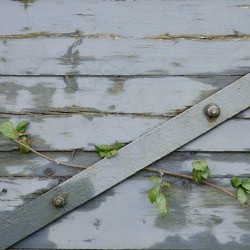Rewilding the soul

In ecology and conservation, there's a lot of talk about rewilding. It has become a buzzword even. For good reason, our dwindling diversity in our countryside and on our planet more widely is causing widespread disruption and breakdown, so the call for rewilding is more than just a fad. In some ways our long term survival even depends on it.
It's true to say that what happens outside of us is a reflection of what happens inside. That how we treat the outer world reflects in part, how we treat ourselves. So what does our domesticated and over controlled outer landscape say about our inner world? Or you could ask; what have we done to our own psyches and souls within this outer system of control and dominance? What aspects of us have we kept out of our wild psyches to keep comfortable and just get on with life. What line have we drawn that says this is allowed and this is not allowed?
What happens when we keep our our grief and sadness, and when we keep our anger, our love and our passion at bay? What is the cost to our souls and health? I don't know how it is for you, but for me, the more I try and control my experience, the more it ends up a dry and lifeless place. But should we just let our negative thoughts run amok? I hear you ask. I’m aware here that how we let these wilder beings in is all important, that just letting these things run about with no care for what happens is no answer. Maybe like outer rewilding, it takes care and attention.
What are these wilder aspects and what has been kept out? To begin, let’s start close to home with something personal, like some quality you have but was not allowed; exuberance, playfulness, quirkiness, some facet of neurodiversity. These get exiled all too often in our families and communities. We hide them away, weed them out, put fences up to keep it all neat and acceptable, so we can fit in, so we can belong and survive.
We have bigger exiles too. In these times, I can’t help thinking of the exiled grief of transgenerational trauma, the pain of what has happened to previous generations. I think of my cultures colonial past and the atrocities and genocides that are hidden and buried. We can all see how that does not go away simply because we wish it.
And then there's more, further out into the forest, to use that metaphor, further out than you can usually feel, beyond the fringes of acceptability, maybe there are other things waiting to be heard? Some deeper unease that things are not ok in the world. Or mysterious callings to live a more full life, a life that won’t be filled with regret and fear when our days are ending.
“The life we refuse is singing to us
From the other side
Step through,
The old life with its comforting certainties
Is not a home for the soul” Daverick Leggat
We may hear the grief of the world, the call of the more than human world, that wants us back again. We may hear our soul that wants to be heard. There's older wisdom there in the deep of the forest. There's knowledge there that is needed, or perhaps ancient and unheard for aeons. According to Martin Shaw, mythologist and storyteller, in the old stories they often say that wisdom or transformation always comes from outside of the village, from the fringes, from the further edges of the forest. To find that wisdom, you have to enter the forest, you have to cross a threshold into the other world. You have to move from what is known and comfortable to what is edgy and even scary. You have to step into the wilds.
For me, the practice of Focusing is an opening to all of these wilder landscapes. It offers a path of inner rewilding, a place where we welcome in every part of ourselves back home, a path where the wisdom that lies at the edge of our consciousness can be touched and heard.
This is also a call to not domesticate and control your soul, a call to be open to what your body knows. To let it speak ancient and wise languages. Let it speak the inherited intelligence of millions of years of living in the world, and of all the wisdom that comes with that. Let us dwell at the forest edge.
blog comments powered by Disqus

